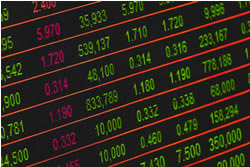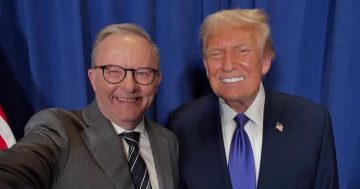Sam Jacobs says the equities team at Credit Suisse has highlighted a list of Australian stocks that could benefit from the fallout over a potential trade war between the US and China.
By Sam Jacobs*
 Stock market volatility is on the rise, and at least part of that can be attributed to the ongoing threat of a trade war between the US and China.
Stock market volatility is on the rise, and at least part of that can be attributed to the ongoing threat of a trade war between the US and China.
As the battle rages on, the equities team at Credit Suisse have highlighted a list of Australian stocks that could benefit from the fallout — and which look the most vulnerable.
“The current structure of the Aussie equity market is overweight the industrialisation of China and underweight the potential re-industrialisation of the US,” said analysts Hasan Tevfik and Peter Liu.
So the pair took a negative view towards Australia’s big miners — BHP, Rio Tinto and Fortescue — in the wake of the 25 per cent US tariff on Chinese steel.
“A rise in US steel capacity will be negative for Australia’s iron ore producers as it is more scrap intensive,” the analysts said.
On the flipside, Bluescope Steel could benefit given the company derives 30 per cent of its earnings from Northstar, a US-based steel producer.
The analysts also cited a potential upside for Qantas, if Boeing — its primary aircraft supplier — offers discounts stemming from lost business as a result of China’s responding tariff on planes.
And agricultural company Nufarm may benefit from its holdings in South American soybean producers — another product included on the Chinese tariff list as part of efforts to target US President, Donald Trump’s supporter base.
Conversely, insurer QBE could suffer from a hit to the US soybean industry, as its US crop insurance division contributes around 20 per cent of total profits.
The analysts also cited risks for their list of stocks susceptible to rising interest rates — the “bondcano” stocks — noting that tariffs can put upward pressure on inflation by raising the cost of goods.
They added that China could still use its huge pile of US foreign-exchange reserves as a bargaining chip in negotiations, and “further selling could put pressure on US Government bond yields to rise”.
For what it’s worth, Tevfik and Liu are of the view that continued escalation into a full-blown trade war is unlikely.
“We remain sceptical that clear-thinking policymakers, even of the populist variety, will engage in the economic vandalism that a trade war will bring,” they said.
However, “the rhetoric is now loud enough for investors to consider more seriously the possibility of rising trade barriers”.
* Sam Jacobs is markets and economics reporter for Business Insider Australia. He tweets at @Mr_SamJacobs.
This article first appeared at www.businessinsider.com.au.





